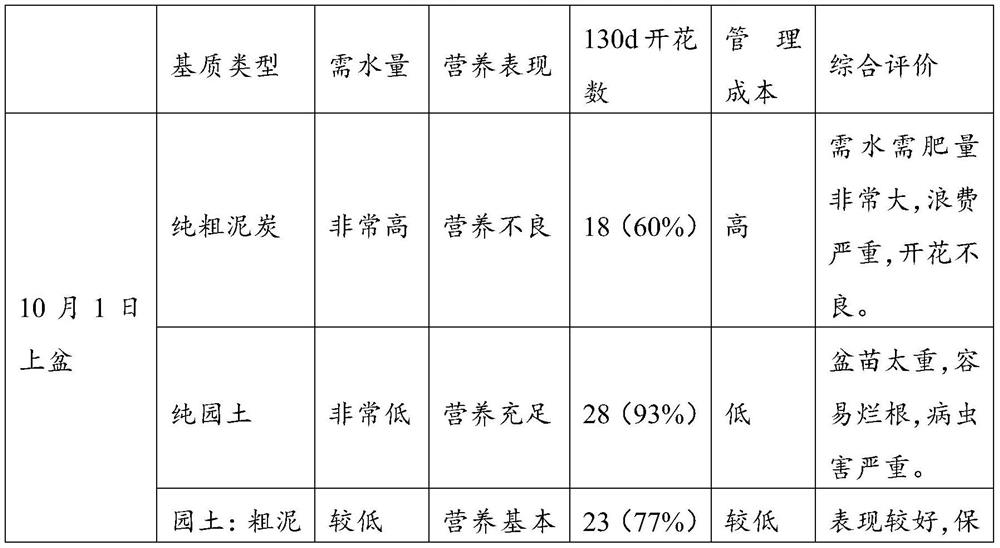Hemerocallis fulva forcing cultivation method
A technology that promotes cultivation and Hemerocallis, applied in horticultural methods, flower cultivation, botanical equipment and methods, etc., to achieve the effect of tidy growth and improved flowering rate
- Summary
- Abstract
- Description
- Claims
- Application Information
AI Technical Summary
Problems solved by technology
Method used
Image
Examples
Embodiment 1
[0040] Hemerocallis variety "Ziguang" promotes cultivation
[0041] The experiment was divided into two periods, October 1, 2019 and January 20, 2020, with 30 pots for each treatment. Excavate a single Hemerocallis plant with a seedling age of more than 6 months from the base, keep as many roots as possible, trim the aboveground part uniformly to a height of 5 cm, and divide the root system into two groups, one group keeps the complete root system, and the other group cuts it to 8-10 cm. . Dry the wound naturally and prepare for potting.
[0042]Substrate preparation. Prepare the garden soil, coarse peat and perlite. The specific parameters are: the organic matter content of the garden soil is about 390g / kg, the components with a particle size of about 0.003mm account for more than 90%, the fiber thickness of the coarse peat is 10-25mm, and the pearl The rock grain size is about 5mm. The three substrates were wetted with water and mixed well, and the water content reached ...
Embodiment 2
[0051] Hemerocallis variety "Ziguang" promotes cultivation
[0052] The experiment was divided into two periods, October 1, 2019 and January 20, 2020, with 30 pots for each treatment. The hemerocallis cultivar "Ziguang" with the short-cut root system was dried according to the method in Example 1 and the wound was set aside. Prepare the following 4 different types of substrates:
[0053] 1) Pure coarse peat;
[0054] 2) Pure garden soil;
[0055] 3) garden soil: coarse peat: perlite = 4:4:2 (volume ratio);
[0056] 4) Garden soil: coarse peat: perlite = 5:3:2 (volume ratio). Each component specification is with embodiment 1.
[0057] Plant the prepared Hemerocallis seedlings in the above-mentioned different substrates, one plant per pot. The type of flowerpot is the same as that in Example 1, and 9g of Aolufei No. 5 is evenly mixed into the substrate in the middle and lower part of each pot, and watered enough. The potted seedlings were moved into the artificial climate...
Embodiment 3
[0063] Hemerocallis variety "Ziguang" promotes cultivation methods
[0064] The experiment in this example was on October 1, 2019, and each treatment contained 30 pots of experimental materials. Excavate a single Hemerocallis plant with a seedling age of more than 6 months from the base, keep as many root systems as possible, trim the aboveground part uniformly to a height of 5 cm, and cut the root system to a length of 8 to 10 cm. Dry the wound naturally and prepare for potting.
[0065] Substrate preparation. Prepare the garden soil, coarse peat and perlite. The specific parameters are as follows: the organic matter content of the garden soil is about 387g / kg, and the components with a particle size of 0.001-0.005mm account for 92%. The particle size is about 5mm. The three substrates were wetted with water and mixed well, and the water content reached 72.5%, and then the garden soil, coarse peat, and perlite were evenly mixed according to the volume ratio of 5:3:2, and s...
PUM
 Login to View More
Login to View More Abstract
Description
Claims
Application Information
 Login to View More
Login to View More - R&D
- Intellectual Property
- Life Sciences
- Materials
- Tech Scout
- Unparalleled Data Quality
- Higher Quality Content
- 60% Fewer Hallucinations
Browse by: Latest US Patents, China's latest patents, Technical Efficacy Thesaurus, Application Domain, Technology Topic, Popular Technical Reports.
© 2025 PatSnap. All rights reserved.Legal|Privacy policy|Modern Slavery Act Transparency Statement|Sitemap|About US| Contact US: help@patsnap.com



